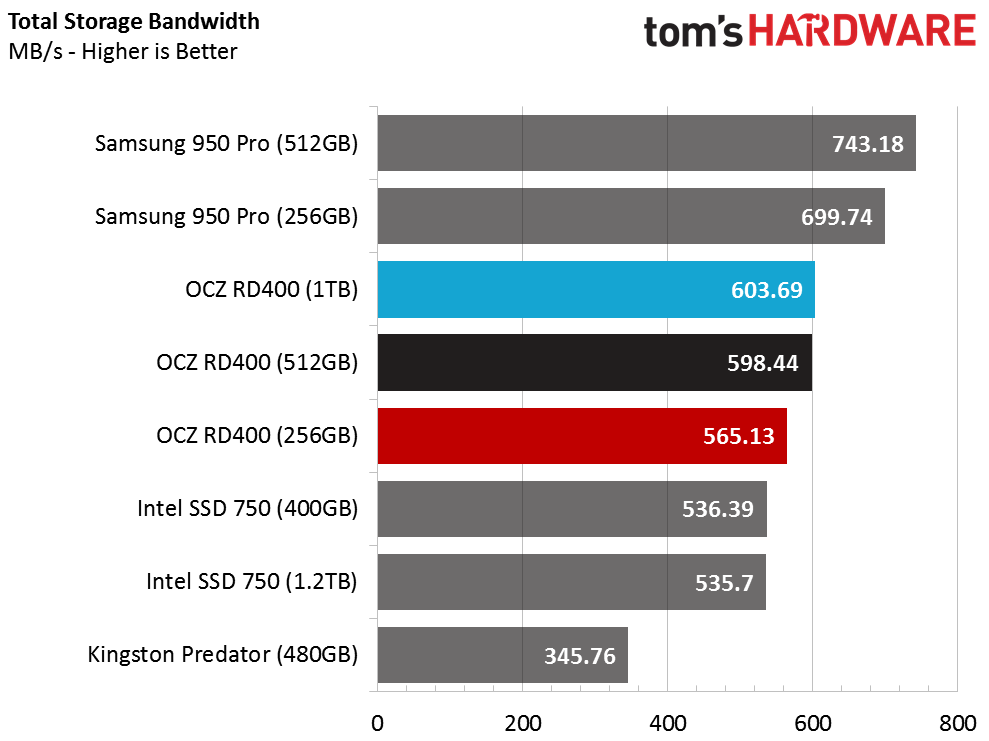OCZ RD400 NVMe SSD Review
Why you can trust Tom's Hardware
Real-World Software Performance
PCMark 8 Real-World Software Performance
For details on our real-world software performance testing, please click here.
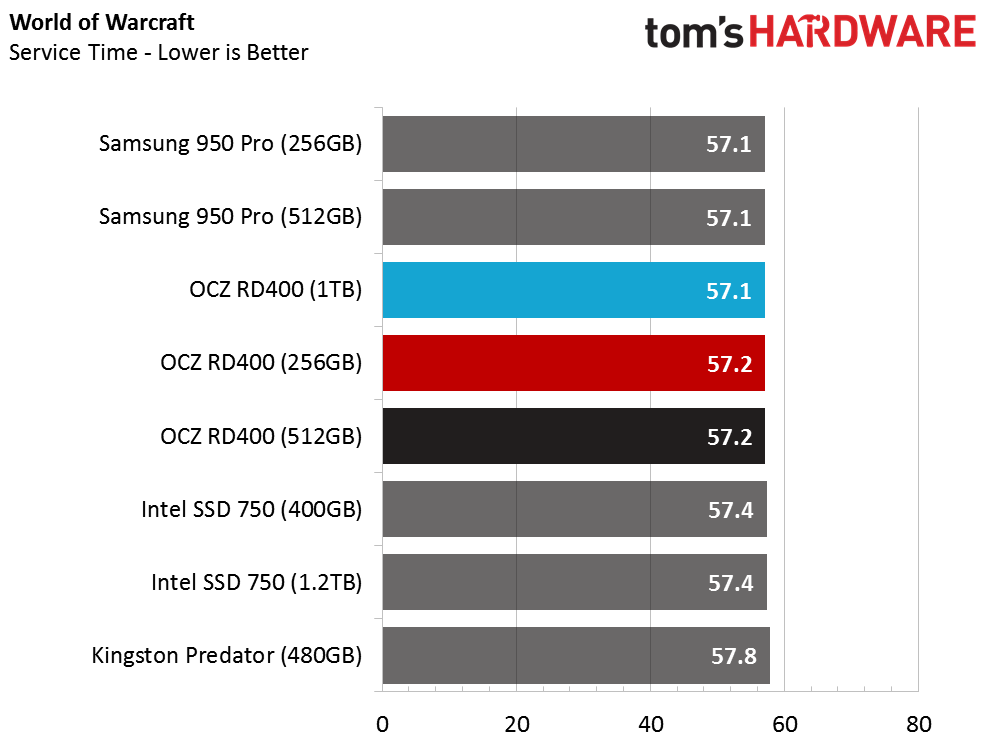
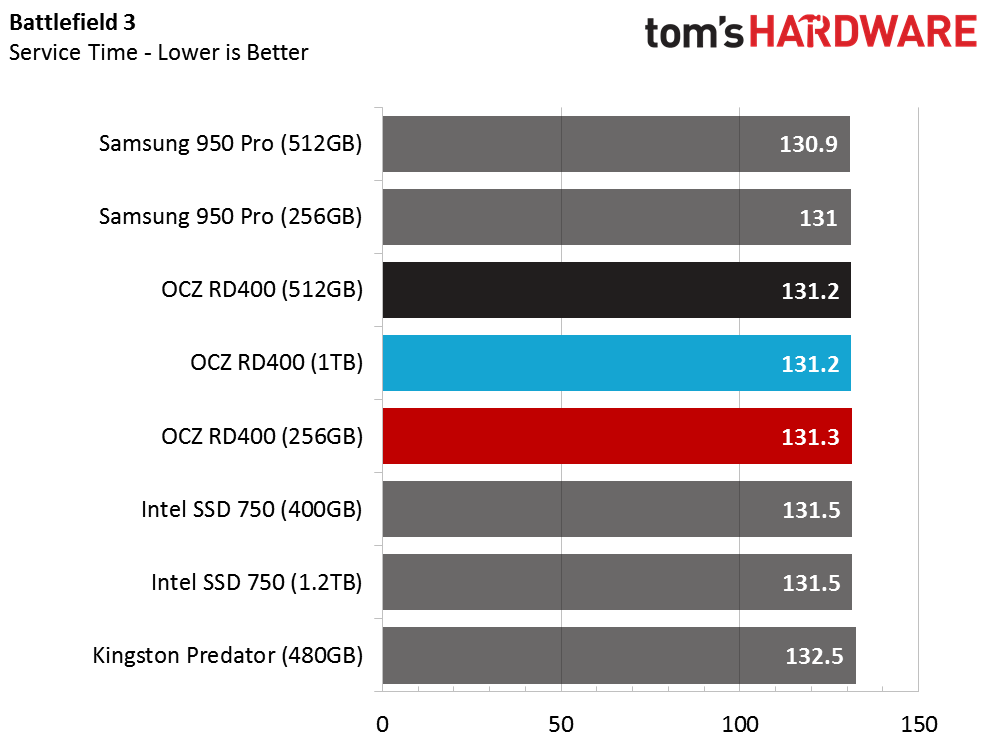
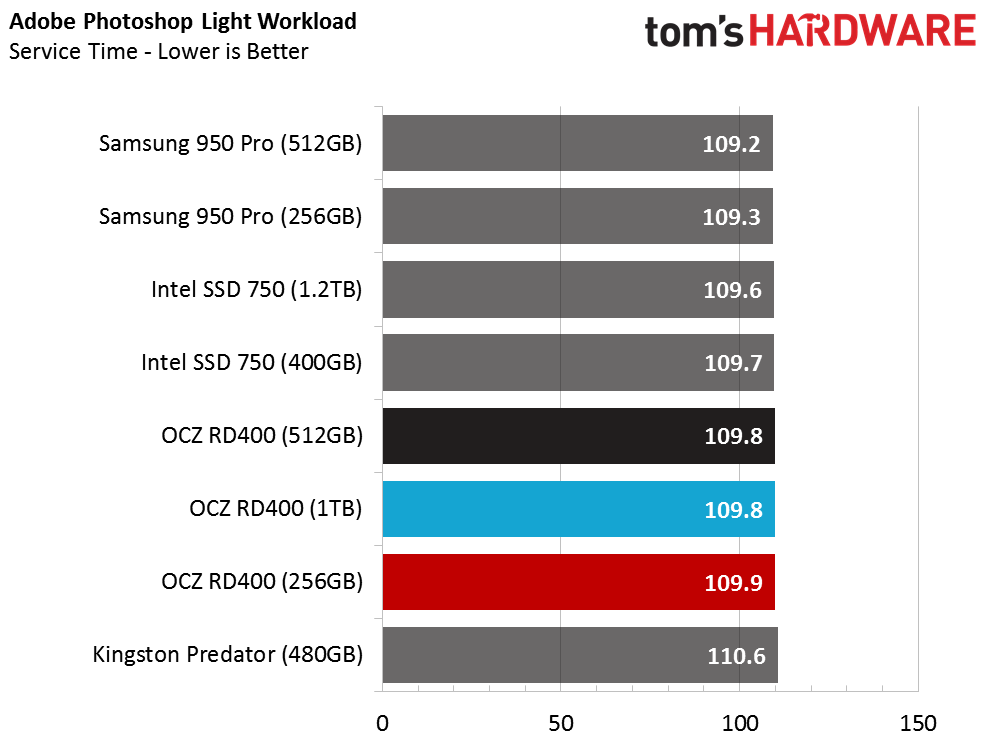
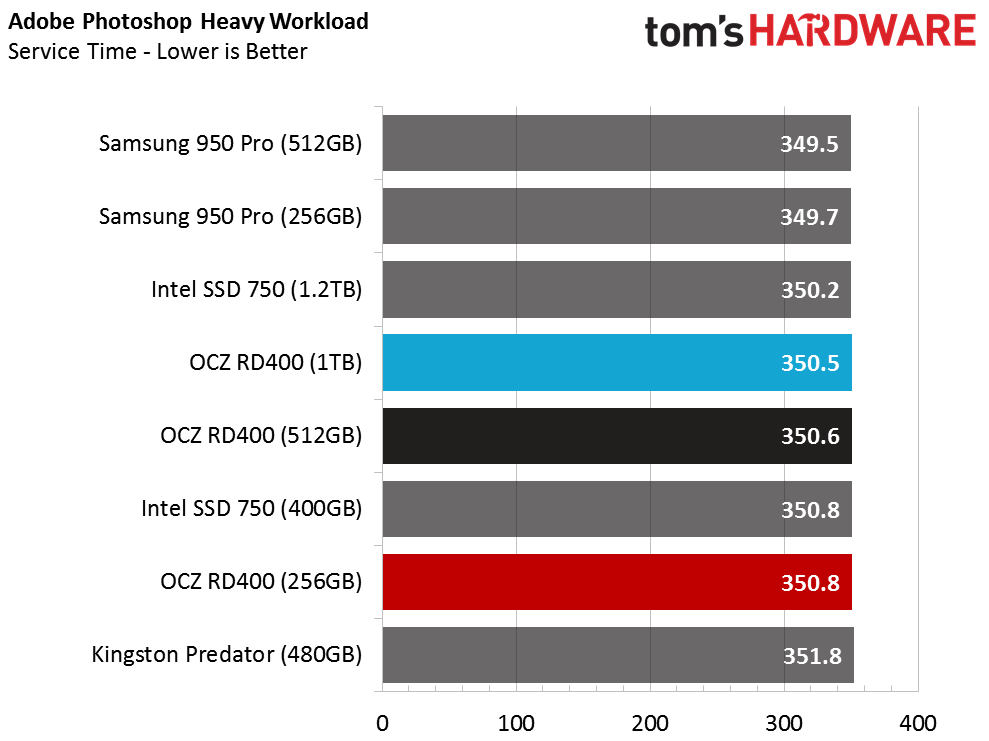
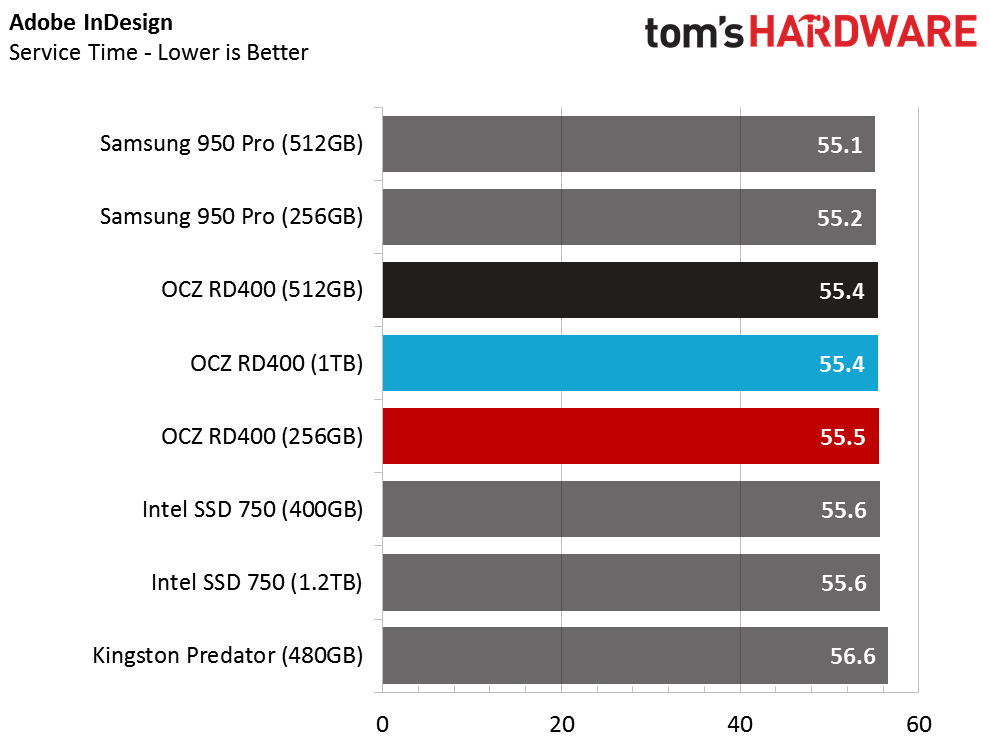
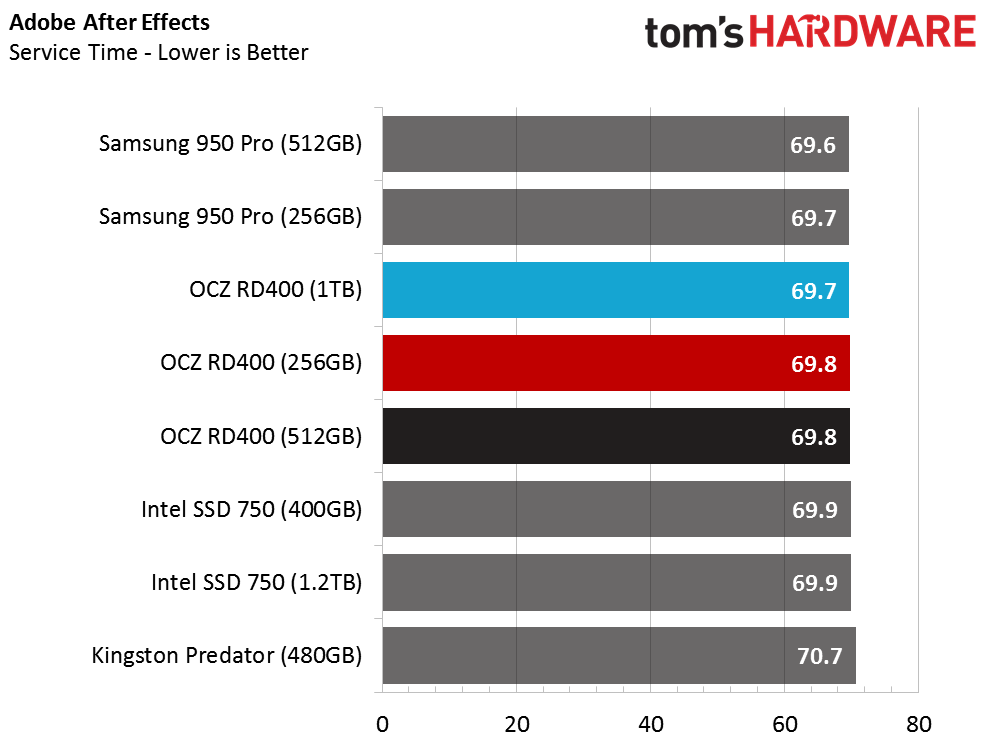
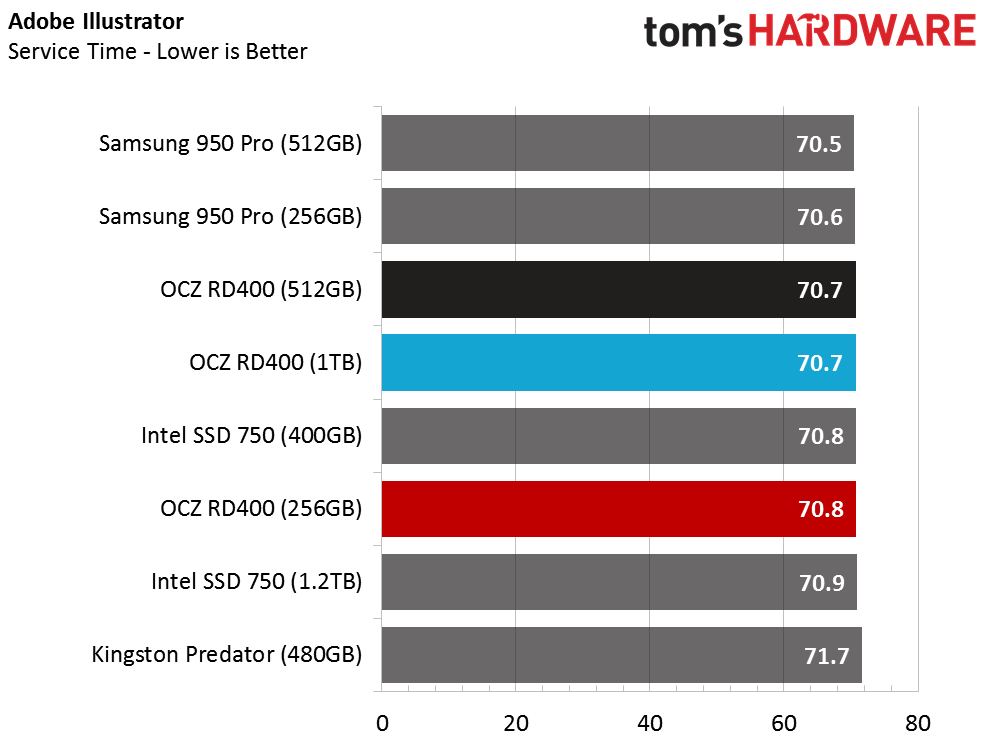
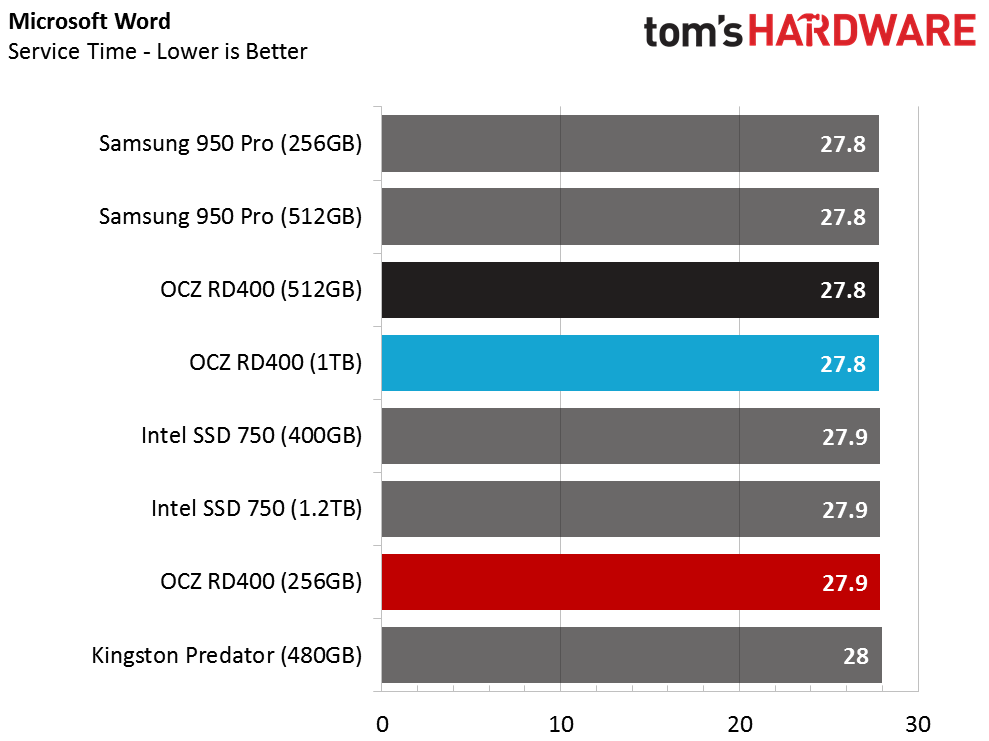
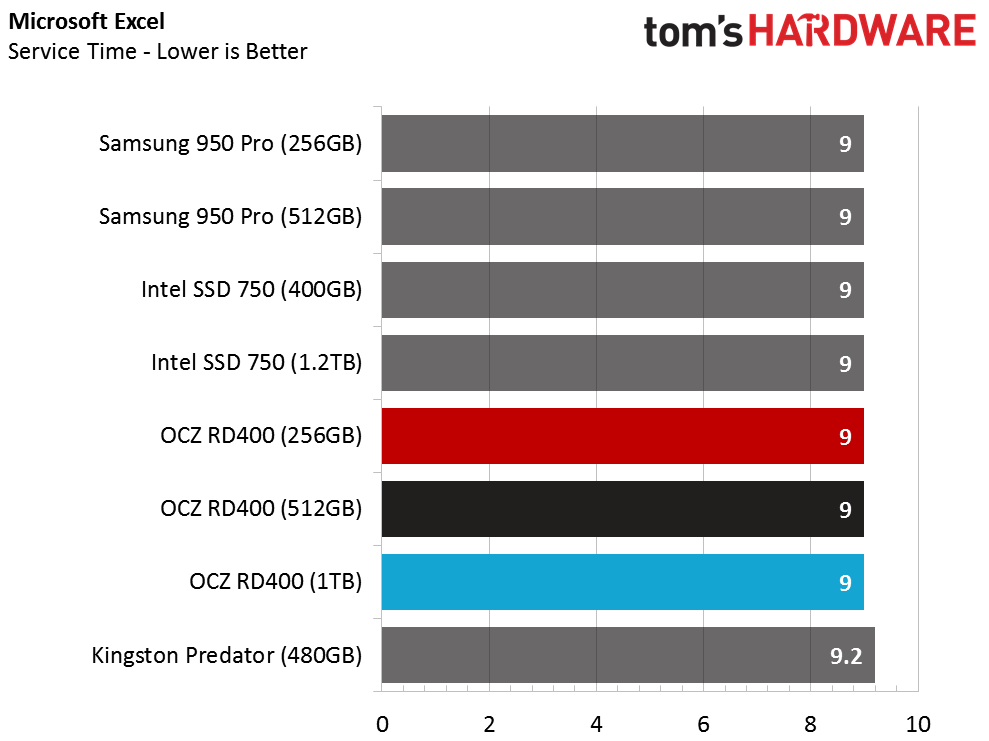
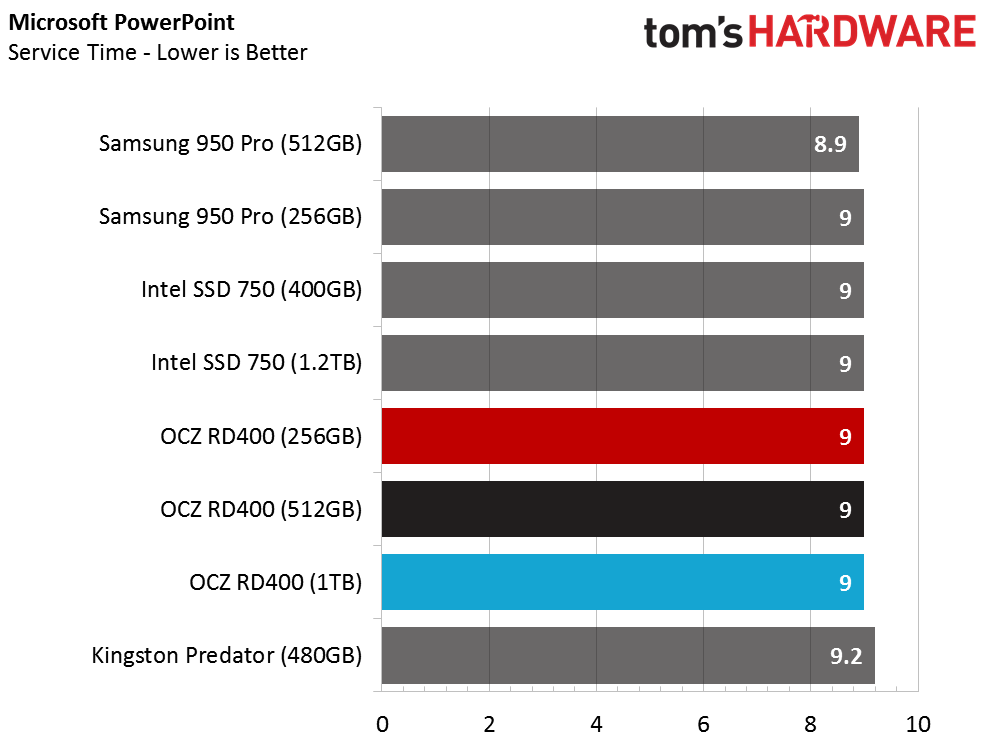
All of the products perform very well in the standard consumer applications that most of us run daily. The NVMe-enabled drives show a clear and consistent lead over the AHCI-based Kingston HyperX Predator 480 GB SSD. All of the drives deliver higher performance in comparison to SATA-based flash storage products.
Total Application Storage Bandwidth
The drives in the test pool are premium SSDs and command a higher price than SATA SSDs. In exchange, users receive exceptional performance beyond what SATA SSDs are capable of achieving in many applications.
The OCZ RD400 SSDs fall below the Samsung 950 Pro products with average results displayed in throughput. OCZ has a capacity advantage with the 1 TB model, but the two smaller capacity sizes will need a significant price advantage to entice users to choose the RD400 over the 950 Pro.
PCMark 8 Advanced Workload Performance
To learn how we test advanced workload performance, please click here.
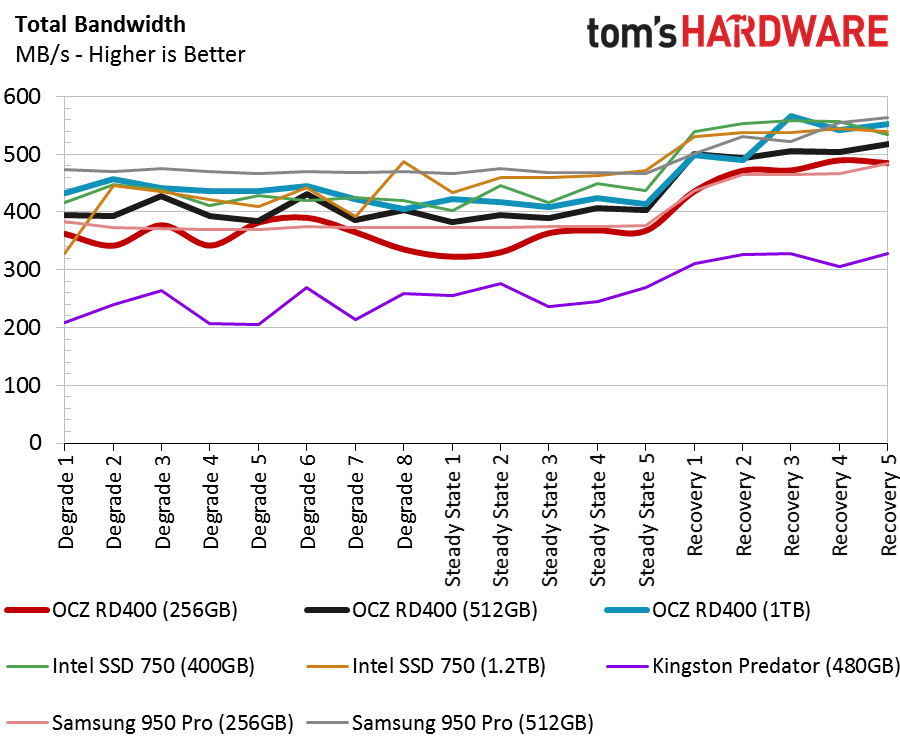
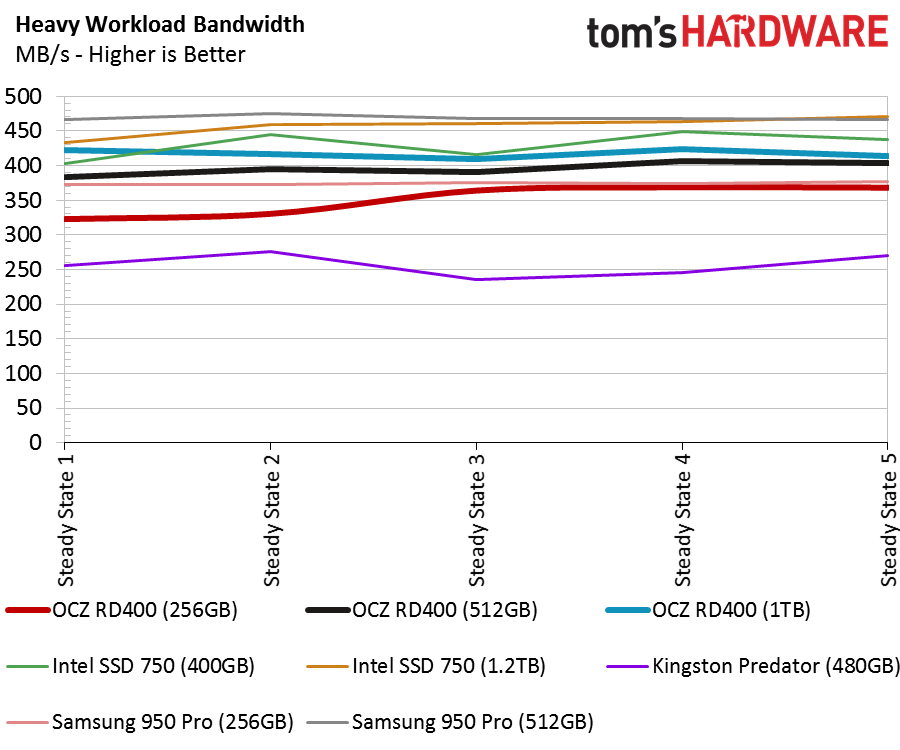
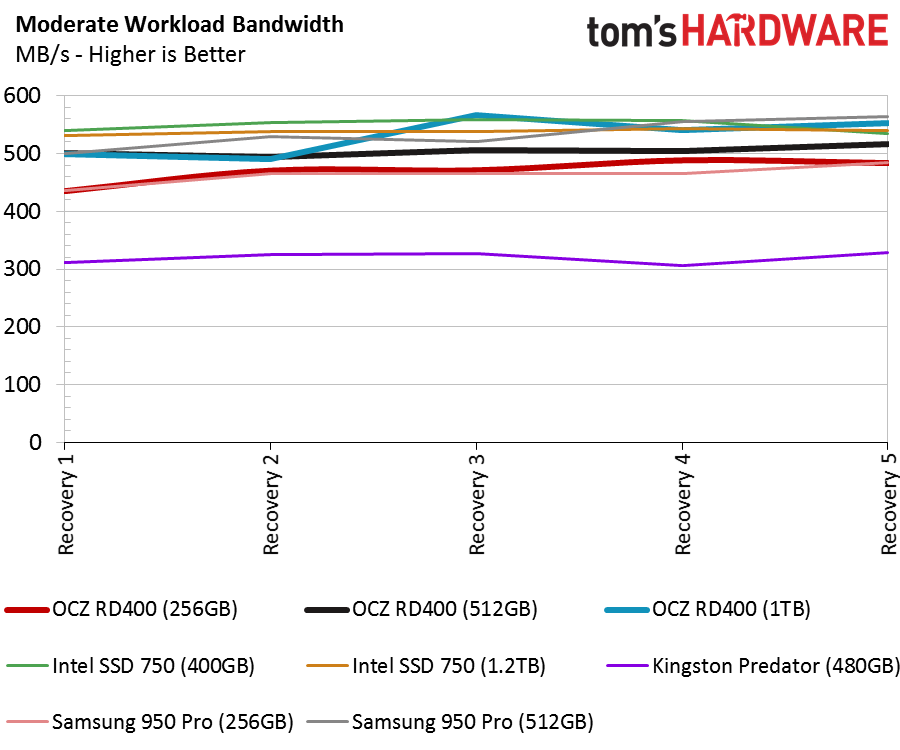
The OCZ RD400 SSDs perform very well under steady-state and recovery conditions, but still lag behind the Samsung 950 Pro 512 GB and Intel SSD 750. The difference in performance during the recovery phases is trivial (at best) for the two smaller RD400 products in comparison to the 950 Pro 512 GB and Intel SSDs. The RD400 1 TB SSD keeps pace with the other SSDs in the recovery phase. It would be difficult to tell those four products apart under moderate to slightly heavy workloads in a consumer or workstation environment.
Total Access Time
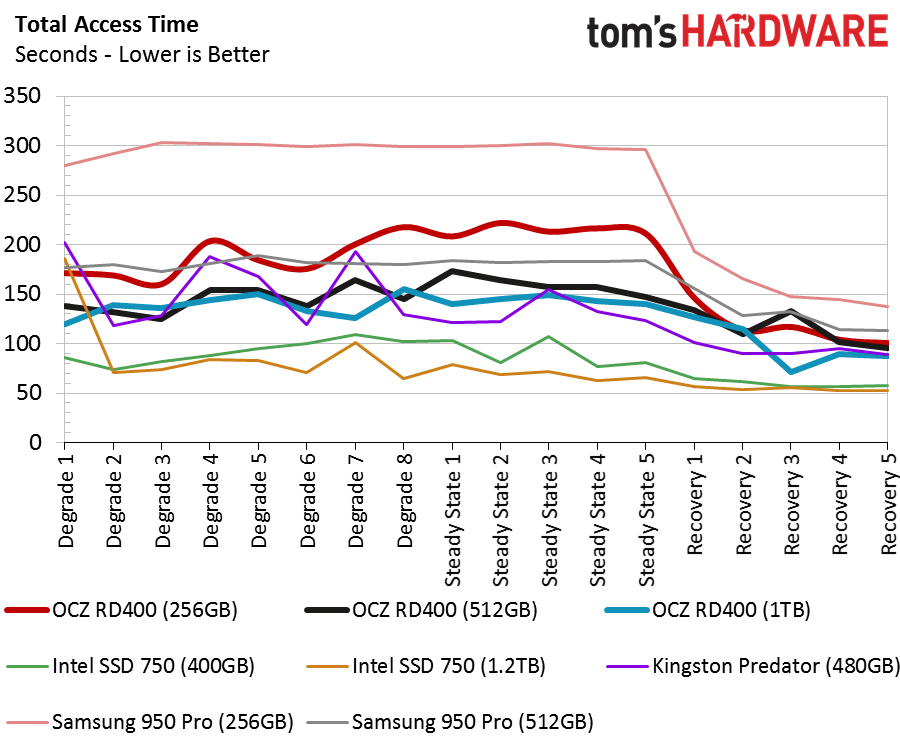
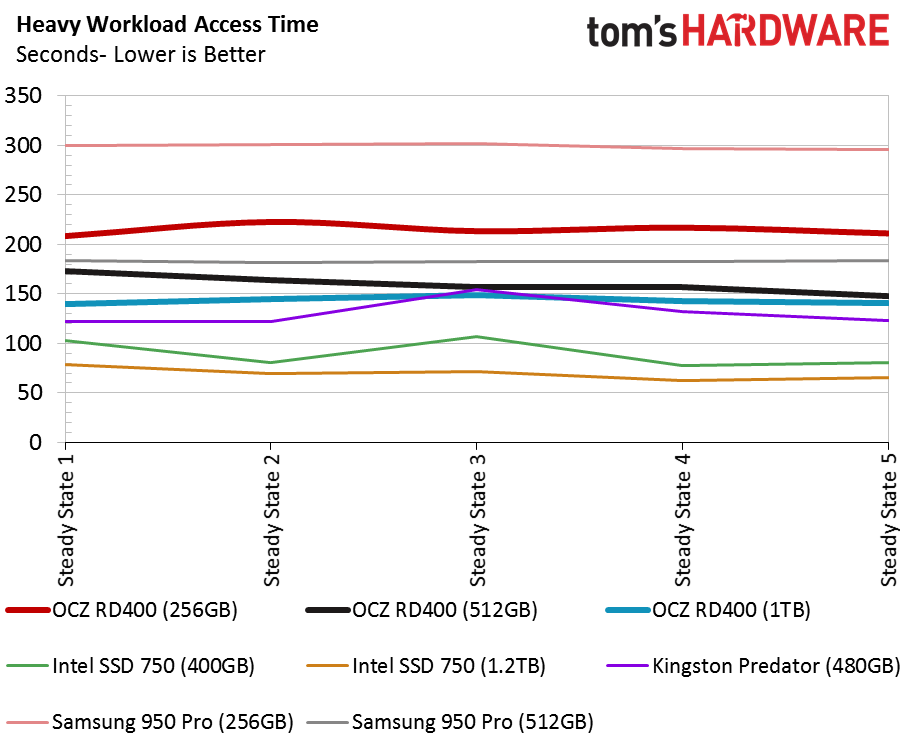
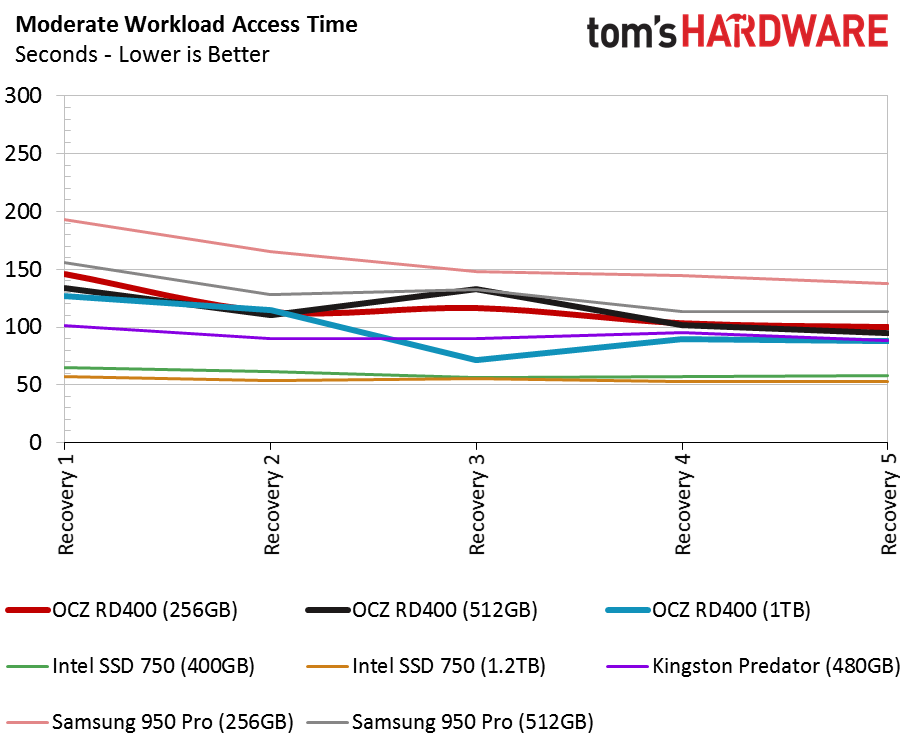
We often find that access times (latency) and throughput performance are the inverse of each other. The access time tests allow us to take a closer look at the latency because we are measuring on a smaller scale.
Get Tom's Hardware's best news and in-depth reviews, straight to your inbox.
The two Intel SSD 750 SSDs deliver the best application access time of any consumer SSD on the market today. The other SSDs on the chart follow closely behind and deliver superior performance in comparison to SATA-based products.
Notebook Battery Life
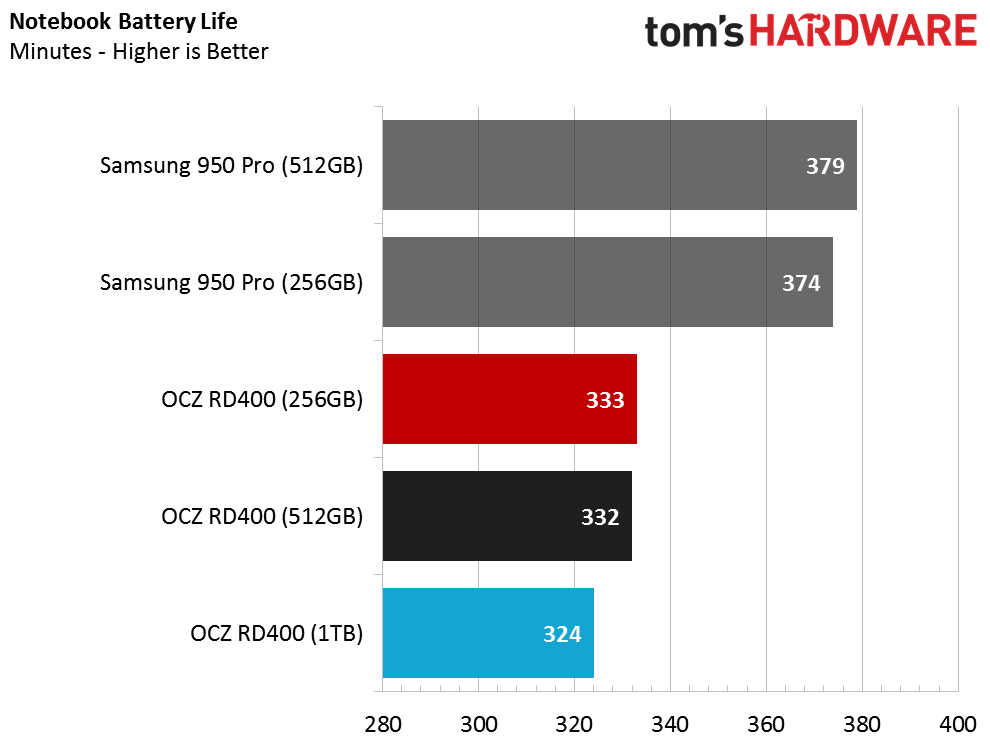
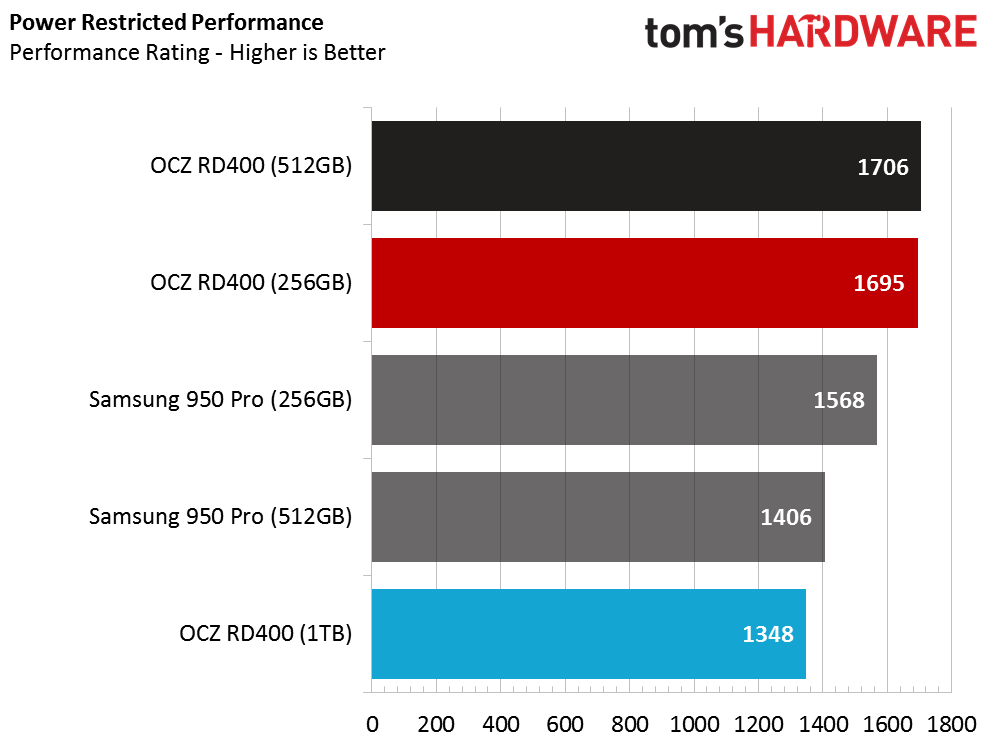
Lenovo was kind enough to send us new notebooks for our Notebook Battery Life test. The Lenovo Ideapad Y700-17 can boot from both SATA and PCIe NVMe SSDs, which is a unique and unmatched feature in the industry at this time. The dual-bootability makes it the ideal platform for comparing nearly all SSDs on a singular platform.
We also updated our test while migrating to the new notebook platform. MobileMark 2014 version 1.5 is the latest version from BAPco. Unlike other benchmarks that only measure battery life, MobileMark measures battery life and performance simultaneously. Our test also migrates from Windows 8.1 Pro to Windows 10.
The Samsung 950 Pro SSDs provide longer battery life than the OCZ RD400 SSDs. The two smaller OCZ drives deliver slightly higher performance under power-restricted notebook conditions. Other factors come into play at the same time, such as limited processor, system memory and bus bandwidth.
MobileMark 2014 adds more detail to the overall system performance portion of the results than the previous version. We are still sorting through the performance measurements to determine how much differentiation exists between small changes in the score. We will know more after running more drives though the test. We also plan to implement other power measurements in the future. Look for an article detailing the new power tests in the coming month.
Current page: Real-World Software Performance
Prev Page Mixed Workloads And Steady State Next Page Conclusion
Chris Ramseyer was a senior contributing editor for Tom's Hardware. He tested and reviewed consumer storage.
-
2Be_or_Not2Be I believe Toshiba should just kill the OCZ brand name. As the author mentions, a lot of people have bad reactions to OCZ products. For every user who had good memories, there are at least 3-4 others who don't. So make a clean break - kill the OCZ brand name & either create a new one or just use Toshiba.Reply -
CaedenV ReplyI believe Toshiba should just kill the OCZ brand name. As the author mentions, a lot of people have bad reactions to OCZ products. For every user who had good memories, there are at least 3-4 others who don't. So make a clean break - kill the OCZ brand name & either create a new one or just use Toshiba.
I mean... have you ever used a Toshiba laptop? You think people have bad memories of OCZ! At least the OCZ issues only poisoned the cheap enthusiast market. Toshiba's own bad name is far more broad reaching. -
CaedenV My own expierence with OCZ was hit and miss. Their great products were fantastic and cheap, while their crap was really truly crap. 3-4 years ago when I was upgrading to SSDs I bought all OCZ products simple because there was nothing else that was affordable at the time. A lot of their gen2 products were pretty scarry, but their 3rd gen Agility lineup was pretty reliable, and came in much MUCH cheaper than anyone else. I had a Solid 2 and Agility 2 that died on me, which were replaced by an Agility 3 and Vertex 3 (both under warranty). So my expierence was not too terrible.Reply
But then again, you get what you pay for. Any time a new tech comes in that much cheaper than the competition you have to expect failures.
Not to mention, some of their PSUs were fantastic! After they bought PC Power & Cooling you could get essentially a PCnP PSU for $50 less as an OCZ rebrand! I have a 750W 80+Silver OCZ rebrand and it has been running 24/7 for almost 5 years without so much as a hiccup! Granted, their in-house OCZ PSUs were crap... but that's why you do a bit of research before buying. -
2Be_or_Not2Be ReplyI believe Toshiba should just kill the OCZ brand name. As the author mentions, a lot of people have bad reactions to OCZ products. For every user who had good memories, there are at least 3-4 others who don't. So make a clean break - kill the OCZ brand name & either create a new one or just use Toshiba.
I mean... have you ever used a Toshiba laptop? You think people have bad memories of OCZ! At least the OCZ issues only poisoned the cheap enthusiast market. Toshiba's own bad name is far more broad reaching.
So you're saying you would go for the new brand name option. ;)
Actually, I have used several Satellite Pro laptops back in the day; they weren't too bad. Even you really want to go back, I've used Toshiba FDDs (floppy disk drives) w/no problems. I also have a number of Toshiba enterprise drives, both HDD and SSD. So I guess for me, Toshiba has much better brand equity in my mind than OCZ. -
erendofe the only thing I bought of OCZ was a 2 power supplies (700W)... I guess its kinda hard to completely screw them up because both work great. must be luckyReply -
3ogdy "We, and other sites, notice the proliferation of negativity about OCZ in the comments section of every OCZ news post or product review. Undoubtedly, even before reading beyond this point, some are already reaching for their keyboards to pen a chilling tale of a poor product, support or warranty issue.Reply
In the past, OCZ would flaunt a prototype fresh off the production line at a trade show and we would see retail products within a few months. Times have changed and OCZ is now part of Toshiba, which is renowned for its extensive testing, longer development cycles and true tier 1 status."
I'm glad people like you are aware of this. I'm sad people like OCZ might not be. Well, after how successful they ended up being (/irony) they probably know it too.
How about making this cursed name disappear from the market? It just doesn't matter if Toshiba, Samsung, Microsoft, Bill Gates the man himself, God or an alien aliance bought OCZ. We all remember how they treated their customers and how disastrous their products were. I'm gonna stop talking about it here because you ALL know what's up with OCZ. Toshiba, be smart about it...get rid of that name.
It seems very strange that they decided to put their tech under that crappy brand's hood and market those when they already knew what the problem was. Buying one of those products was like buying a lottery ticket.
Dog gamn, even dictionaries from the Roman era had taken notice of this lousy company's products before they went downhil. I'm surprised there are no comments on how OCZ would destroy their own products through the release of updates that bricked their customers' drives for free? (do I see a pattern here? Oh...right, it's OCZ) l:
-
crenwelge I got great customer service out of OCZ, they promptly replaced an SSD for me that I mistakenly thought was bad. Turns out, the problem was with my Asrock hardware. Asrock is either the stupidest or most dishonest company I've ever dealt with. After 5 RMA's I finally gave up on Asrock. I diagnosed and paid for a replacement out of my own pocket.Reply -
Virtual_Singularity The listed numbers look promising for the RD400, no doubt. It may be worth noting that of the top 3 performers we see in the charts, only Samsung at least offers a basic level of data security via their AES 256-bit for User Data Encryption. I thought Intel's 750 series would surely at least include the same, and was a tad surprised to find out they don't.Reply -
LordConrad I have two Vertex 2 drives and one Vertex 3, and never had any problems with them.Reply
I prefer Samsung drives these days because of the V-NAND endurance but the RD400 is a good drive, I would buy one if the price was right.
